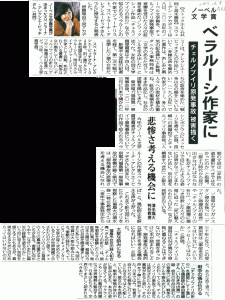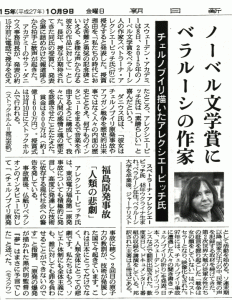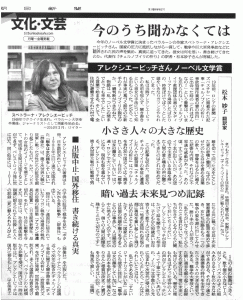Original Japanese written by staffer
The English below translated from the original Japanese by Heeday
The English translation edited by Rev. Dr. Henry French, ELCA
(Sources: article of October 9th, 2015 edition of the Fukushima Minpo newspaper, and those of October 9th and 14th editions of the Asahi Shimbun newspaper)
▼Click each image to enlarge it and read the caption.
Ms. Svetlana Alexievich (67), a Belarussian writer and journalist, has been chosen as the 2015 Nobel Laureate in Literature. She is famous for both “Chernobyl Prayer,” a non-fiction work that presents the stories of witnesses to the Chernobyl disaster, and for other works.
She has held numerous interviews with those victimized by wars, the Chernobyl accident, and by other tragedies, and has presented their stories in her written works. Resisting pressures from the national government, Alexievich has consistently reported the truth of the victims to society.
Her renowned work, “Chernobyl Prayer,” was first published in 1997, and was then translated into many languages, including Japanese. The work has won numerous international awards. Still, the Belarussian president rebuked the work and temporarily suspended its publication within the country.
Says Ms. Svetlana Alexievich, “A state is dedicated to protecting its own interests and power and just lets people disappear into oblivion with time. This makes it all the more important to record the memories of individuals.”
Mr. Ryoichi Wago, a poet resident in Fukushima City, says, “I have interviewed many residents of Fukushima and written down what they say since the earthquake and tsunami disaster of 2011. To me, the choice of Ms. Alexievich as a Nobel Laureate is a great encouragement. In this age of drastic turmoil, her winning the Prize has demonstrated that the world now badly wants documentary work like hers. The truth of Chernobyl and that of Fukushima overlap each other a lot. As rebuilding is in progress in devastated Tohoku, I do feel a silent voice saying, ‘Why do you still talk about experiences of the devastation,’ yet I am now convinced that I should not hesitate to spread the truth. Ms. Alexievich has reminded me that I must spread the truth.”
I (the author) too read “Chernobyl Prayer” and I found it hard to turn the pages—the voices recorded in that book are so vivid and so many of them are similar to the voices heard here in Fukushima. I have been deeply moved by those voices. The book also convinced me that the radiation hazards created by the Chernobyl disaster have no end, which suggests the future of Fukushima as well. What grief!
Now, four years after the 2011 disaster, I find my feelings about radiation changing every single day. Looking back, shortly after the tsunami and earthquake, I was seriously afraid of radiation. Now, I often seem to be insensitive to it. Right after the disaster, we heard a confusing diversity of information about radiation and I did not know what to believe. All I could do was to avoid exposure to radiation as far as I could. Today, my worries are about the future health of citizens here and the discrimination they might face.
I certainly hope a disaster like Fukushima Daiichi meltdown will never happen again. To prevent another tragedy, I do believe that it is crucial to collect and record the voices of the ordinary citizens of Fukushima.



